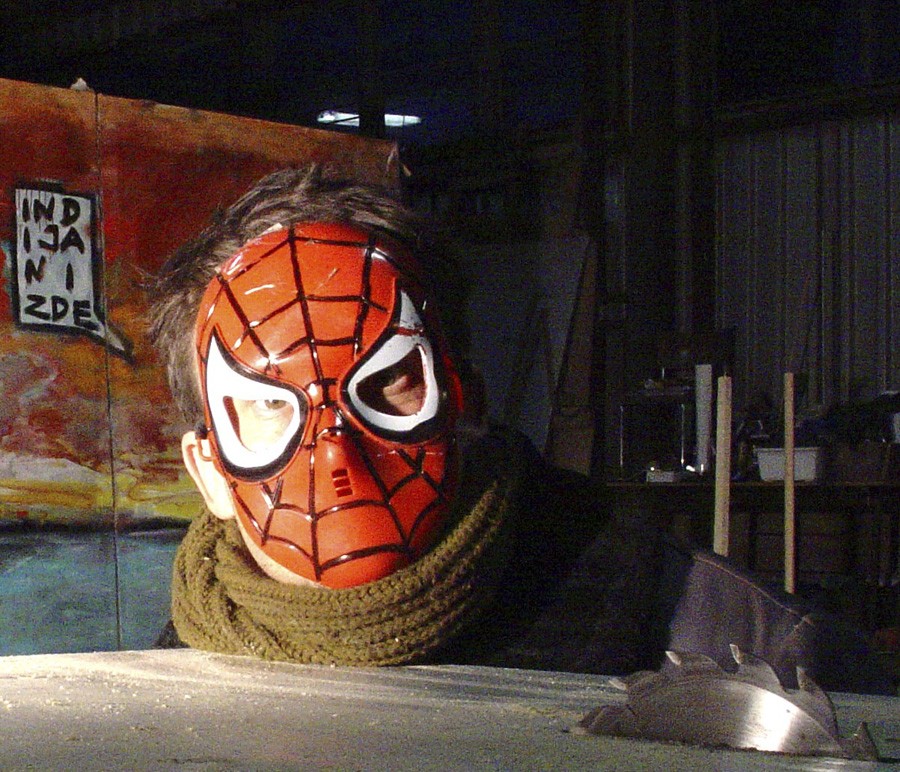
21.03.2013 18:00:00 - 20.04.2013
A word on all those cuntish acts and implications
“There is nothing better than chopping something with an axe” are the words of this metalsmith with an interest in the concept of community in the works of Lévinas and Heidegger. He studied philosophy, but then he and his brother Miroslav got first into music and then theater. He built and hewed several houses. He works with iron, wood and cement. I have never heard him use the word art. He just spits out who made something and how it was made. His works formally resemble art in that they have names, although it is more contemporary today not to have one. Maybe he isn’t even a contemporary artist, but a creator outside of time. The results of his work can be assigned to any artistic style only with difficulty. They are severe and stirring, but unrepentant and void of unnecessary emotion.
Tomáš Bambušek’s exhibition consists of two parts – and it even acts like a two-part epoxy. The oil paintings from the first part are still sticky. They are fresh and contain an admixture of natural tar that will probably never dry completely. The concrete and wood part may not stick as much, but the cement vases are stuck to the ground and impossible to move.
Bambušek has been making art since his school days, but until recently his visual art has been overshadowed by his stage designs for alternative theater projects, in particular those by his brother Miroslav. The two brothers take a very different approach to art (Miroslav to theater and Tomáš to visual art) than today’s culture expects. Their works are the result of a combination of extreme artisanship, a romantic vulgarity that (seen up close) is nothing more than a thin shell on an extremely vulnerable mass, and a rough unfinishedness (though one that smells nice). It isn’t for everywhere, but it also isn’t opera.
Bambušek has honored his concrete works – not just cement vases, but also objects made of tree trunks and sticks – in the exhibition title by calling them cuntish acts. They are organized into scenes between curtains. You can walk among them and remain with them for a moment, live with them. And then maybe arrange your home with them. Maybe you’ll cast your own cement vase from a plastic form or detergent bottle.
The “implications” in the title refer to the paintings. The large-scale works are, technically speaking, old-school – the stretching of the canvas, the application of a base coat, and the composition of the paints used – but in style they approach the most contemporary forms of painted expression. The combination of an attempt at generating natural painted materials with a daring painterly approach provides a far more profound experience that much contemporary painting, whose creators spend little time focusing on the alchemy of colors and the genesis of materials. Tomáš Bambušek replaces the brightly colored playfulness and conceptual approaches of his contemporaries with impulsive monumental paintings created in just a few fortuitously and carefully selected shades of his own intense pigments. The paintings in Cuntish Acts and Implications were all made in the past year and a half. They are for the most part landscapes painted as memories of one brief moment or, on the other hand, in time intervals. Artists Going for a Plein-Air offers a view of a landscape from the window of a car in the rain. Some of the large early evening landscapes have a morning sky. And if you need more than just landscape, one of them shows a large red Ferrari.
Bambušek makes art the way head chef Pohlreich makes entertainment. He applies artisanship, he knows how the material behaves, and he realizes that art is all about imparting mood and his own character, whatever it may be.

Horizontal (flat) edge- rim - of the country circles the head. It tears your attention to two pieces, divides you. Don't divide me! Do I divide you? I' not going to tear this.
What is under the waterline is the earth, what is above the waterline is heaven and vice versa.
And still once more:
1 - what do you see, Hranattinni?
H - phat, phat, phat, one
1- what do you hear Hranattinni?
H - moodoo?
H - mooded
1 - and that waterline?
H - a rim of a horror and Stáňa stands in honor
blahoslav játro